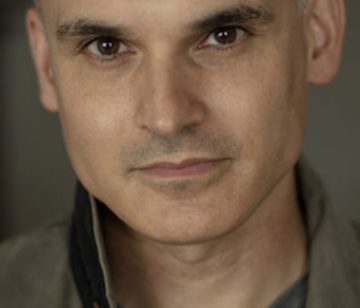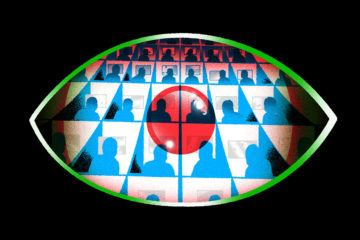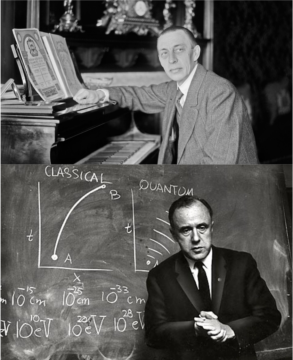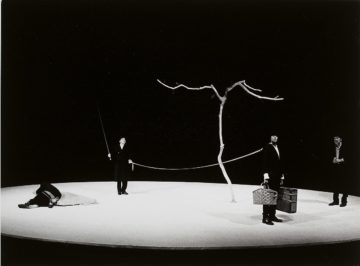Benjamin Ehrlich in Nautilus:
 In 1914, when World War I broke out, Santiago Ramón y Cajal, the most influential neuroscientist in the world—the man who discovered brain cells, later termed neurons— published only one article, by far his lowest output ever. “The horrendous European war of 1914 was for my scientific activity a very rude blow,” Cajal recalled. “It altered my health, already somewhat disturbed, and it cooled, for the first time, my enthusiasm for investigation.” Cajal’s tertulia, or café social circle, was “overwhelmed with horror and abomination, erasing the last relics of our youthful optimism.” Science was supposed to be universal, but now, as mail became unreliable, telegraph lines were cut, trenches were dug, and borders were almost constantly closed, scientists could not even share their work internationally.
In 1914, when World War I broke out, Santiago Ramón y Cajal, the most influential neuroscientist in the world—the man who discovered brain cells, later termed neurons— published only one article, by far his lowest output ever. “The horrendous European war of 1914 was for my scientific activity a very rude blow,” Cajal recalled. “It altered my health, already somewhat disturbed, and it cooled, for the first time, my enthusiasm for investigation.” Cajal’s tertulia, or café social circle, was “overwhelmed with horror and abomination, erasing the last relics of our youthful optimism.” Science was supposed to be universal, but now, as mail became unreliable, telegraph lines were cut, trenches were dug, and borders were almost constantly closed, scientists could not even share their work internationally.
…“I have to admit,” Cajal wrote in a new weekly newspaper, founded so that prominent intellectuals could share their views on the war, “I have a very low opinion of human beings.” As the “last hunter animal,” he wrote, we retain the “foul instincts” of beasts. “Our nerve cells continue to react in the same way as in the Neolithic Age,” he lamented. Because of “evolutionary resistance,” an “excruciating biological fact,” Cajal claimed that war will never be eradicated. All that civilization can hope to do is prolong the intervals of peace, but the “destructive phase” will always return, with each war becoming more horrifying. “In about twenty or thirty years, when the orphans of the present war will be men, the same stupendous massacre will be repeated,” he predicted with chilling accuracy. Suddenly, Cajal realized that the brain was not perfecting itself by evolution, as he had once believed. “Our descendants will be as putrid as we are,” he concluded.
More here.

 When his first novel,
When his first novel, For many decades, part of the premise behind AI was that artificial intelligence should take inspiration from natural intelligence. John McCarthy, one of the co-founders of AI, wrote groundbreaking papers on
For many decades, part of the premise behind AI was that artificial intelligence should take inspiration from natural intelligence. John McCarthy, one of the co-founders of AI, wrote groundbreaking papers on  I am trying, in reviewing Why We Are Restless, an excellent new book by Benjamin Storey and Jenna Silber Storey, to keep myself out of it. My usual essayistic approach, I fear, will lead a reader to think that I object to the book’s diagnosis of what went wrong with the modern world more than I do. Besides, the tendency of critics to involve themselves in their reviews is irritating, and surely an example of the type of Montaignean introspection that may well be making us restless. But Why We Are Restless stands out among other books like it by answering the question implied by its title with rigor and charity, by (mostly) succeeding in presenting the view it contests “in terms of the most decent human aspirations.” Cataloguing one’s own restlessness, or subjecting readers to one’s bargain-bin Tocquevillian observations about the United States of America, would veer dangerously into the Montaignean territory here scrutinized. I will make an attempt (essai), in other words, to share some thoughts (pensées) about this fine book.
I am trying, in reviewing Why We Are Restless, an excellent new book by Benjamin Storey and Jenna Silber Storey, to keep myself out of it. My usual essayistic approach, I fear, will lead a reader to think that I object to the book’s diagnosis of what went wrong with the modern world more than I do. Besides, the tendency of critics to involve themselves in their reviews is irritating, and surely an example of the type of Montaignean introspection that may well be making us restless. But Why We Are Restless stands out among other books like it by answering the question implied by its title with rigor and charity, by (mostly) succeeding in presenting the view it contests “in terms of the most decent human aspirations.” Cataloguing one’s own restlessness, or subjecting readers to one’s bargain-bin Tocquevillian observations about the United States of America, would veer dangerously into the Montaignean territory here scrutinized. I will make an attempt (essai), in other words, to share some thoughts (pensées) about this fine book. W
W Are you an “insider threat?”
Are you an “insider threat?”

 Lanchester’s square law was formulated during World War I and has been taught in the military ever since. It is marginally relevant to the war in Ukraine, particularly the balance between the quantity and quality of the two armies’ weapon systems.
Lanchester’s square law was formulated during World War I and has been taught in the military ever since. It is marginally relevant to the war in Ukraine, particularly the balance between the quantity and quality of the two armies’ weapon systems.
 I regret not having children younger. Like, much younger. I was thirty-six when my first child, now four, was born; thirty-eight when my second was born. I wish I had done it when I was in my early twenties. This is an unpopular perspective. I know this because when I’ve raised this feeling with friends, many of whom had children similarly late in life, I’ve been met with a strong resistance. It’s not just that they don’t share my feelings, that their experience of having children later in life is different to mine, it’s that they somehow mind me feeling the way that I do. They think that I am wrong – mistaken – to feel this way. It upsets them.
I regret not having children younger. Like, much younger. I was thirty-six when my first child, now four, was born; thirty-eight when my second was born. I wish I had done it when I was in my early twenties. This is an unpopular perspective. I know this because when I’ve raised this feeling with friends, many of whom had children similarly late in life, I’ve been met with a strong resistance. It’s not just that they don’t share my feelings, that their experience of having children later in life is different to mine, it’s that they somehow mind me feeling the way that I do. They think that I am wrong – mistaken – to feel this way. It upsets them.  The dandelion is thousands of miles from home. It has been in America learning about the world beyond and perhaps it wants to return. It has lived thousands of sad lives. Finally after 300 years, a seed clings to an old man’s jacket as he boards a plane, and happens to land in a small patch of dirt right by the Charles de Gaulle airport; the dandelion is welcomed home graciously, and they share the stories of what has happened in its absence. They notice little differences to him. He has mutated slightly; the increased sun in America has made his petals more yellow; the lawn mowers have made him shorter; the pesticides have made him stronger. They don’t talk to him about the sun or the lawn mowers or the pesticides, though. They talk about their shared home in France.
The dandelion is thousands of miles from home. It has been in America learning about the world beyond and perhaps it wants to return. It has lived thousands of sad lives. Finally after 300 years, a seed clings to an old man’s jacket as he boards a plane, and happens to land in a small patch of dirt right by the Charles de Gaulle airport; the dandelion is welcomed home graciously, and they share the stories of what has happened in its absence. They notice little differences to him. He has mutated slightly; the increased sun in America has made his petals more yellow; the lawn mowers have made him shorter; the pesticides have made him stronger. They don’t talk to him about the sun or the lawn mowers or the pesticides, though. They talk about their shared home in France.

 Halfway through a pilgrimage, it’s a good thing to remember why you’re on it – where you hope it’s taking you. I’m following a plan to consider the strangely numerous churches of this little Portland neighborhood, just a half-mile square but crowded with varieties of religiosity.
Halfway through a pilgrimage, it’s a good thing to remember why you’re on it – where you hope it’s taking you. I’m following a plan to consider the strangely numerous churches of this little Portland neighborhood, just a half-mile square but crowded with varieties of religiosity.
 In the last two decades I have been to China many times, mostly for lectures and conferences primarily in Beijing and Shanghai. Of course, compared to what I saw in my first visit in 1989, China has undergone a dramatic economic transformation. The most dazzling of commonly visible changes are in infrastructure, highways, skyscrapers, bullet trains, airports, etc. There are parts of Shanghai now, say the eye-catchingly rich Pudong district, where once coming out of my hotel for a moment I was confused if I was really anywhere near the Shanghai city I had seen before. My academic colleagues tell me that the pay scales in top universities are now almost the same as in America, in order to attract top talent back to China. Chinese airports and high-speed trains are certainly more advanced than the ones you see in most American cities. My Chinese students in Berkeley have often told me that in application of digital technology in daily life (particularly in retail trade and local transportation and communication) they are struck by how backward the US is compared to China.
In the last two decades I have been to China many times, mostly for lectures and conferences primarily in Beijing and Shanghai. Of course, compared to what I saw in my first visit in 1989, China has undergone a dramatic economic transformation. The most dazzling of commonly visible changes are in infrastructure, highways, skyscrapers, bullet trains, airports, etc. There are parts of Shanghai now, say the eye-catchingly rich Pudong district, where once coming out of my hotel for a moment I was confused if I was really anywhere near the Shanghai city I had seen before. My academic colleagues tell me that the pay scales in top universities are now almost the same as in America, in order to attract top talent back to China. Chinese airports and high-speed trains are certainly more advanced than the ones you see in most American cities. My Chinese students in Berkeley have often told me that in application of digital technology in daily life (particularly in retail trade and local transportation and communication) they are struck by how backward the US is compared to China.